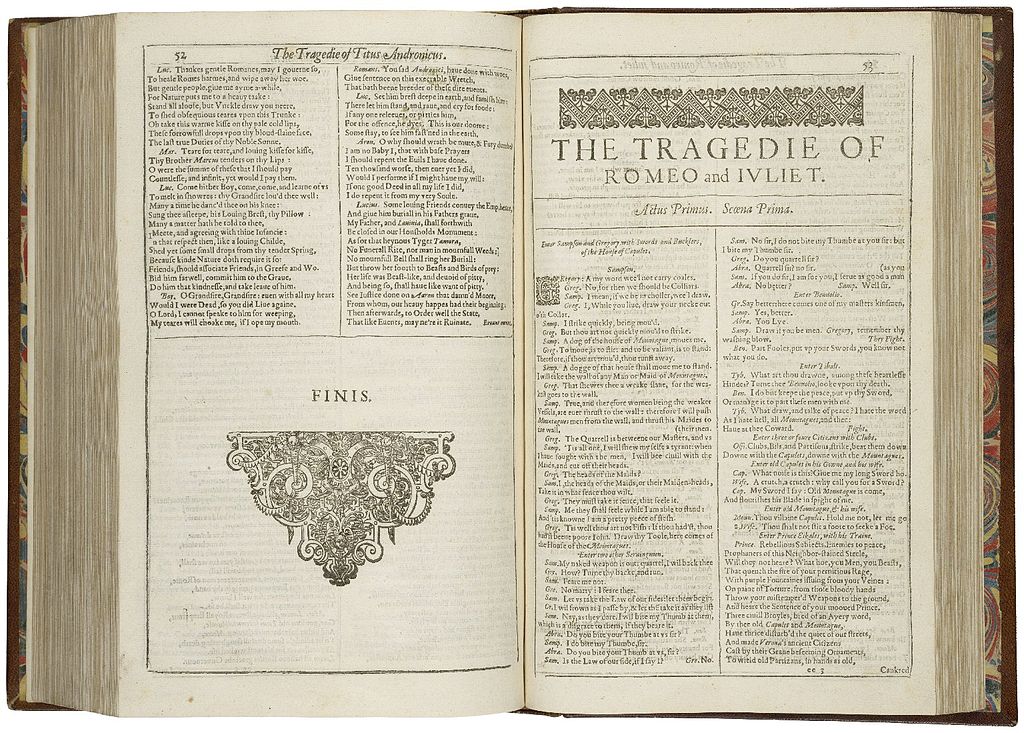
Act III
Scene 1
Students should understand the events that lead to Mercutio’s death. Always sensible, Benvolio attempts to persuade Mercutio to leave the neighborhood since the weather is hot (hot weather tends to make people irritable), and the Capulets are close by. These circumstances that will provoke another fight. When Mercutio, true to form, mocks his wise friend, and Tybalt arrives looking for Romeo, Benvolio again attempts to convince Mercutio to leave. Romeo arrives and is reluctant to accept Tybalt’s challenge; the last thing the new bridegroom wants is to get involved in a duel, even when Tybalt gives him a pretext by insulting him. Mercutio is annoyed that Romeo ignores Tybalt’s insults and gets angry enough to draw his sword challenging the obnoxious Tybalt to a duel. At this point, it’s a good idea to stop the tape and ask three boys to stand in front of the class, books in hand, and act the parts of the three young men complete with plastic swords. This strategy allows the class to better appreciate the sequence of events. Mercutio and Tybalt fight, Romeo comes between them to stop the fight, and, seizing his chance, Tybalt mortally wounds Mercutio then runs off. In his dying moments, Mercutio repeatedly curses the Capulets and Montagues and dies off stage moments after uttering a pun.
Mercutio’s death is the direct result of his own impetuous behavior and Tybalt’s rage. Mercutio should have listened to Benvolio. But the situation worsens. Romeo is horrified at the turn of events. In an instant, he realizes several facts, all of them contributing to the tragedy that has just occurred: Romeo caused Mercutio’s death by intervening in the sword fight, Mercutio dies because Romeo refuses to accept Tybalt’s challenge, and Mercutio is killed by Juliet’s cousin. The enormity of all this enrages Romeo to such a pitch that when Tybalt returns (Oh, why did he have to return?), he furiously kills Tybalt.
We discuss the decorum principle. Students should know that this is a dramatic principle determined by the ancient Greek philosopher Aristotle who decreed that all violence in drama should occur off stage. Shakespeare has Mercutio die off stage and Tybalt on stage perhaps because Mercutio is a frivolous but likeable young man, and Tybalt is unattractive. Thus, an audience would find it less bearable to witness Mercutio’s death than Tybalt’s. A more important reason, though, is that Tybalt’s death is the play’s turning point; thus, Shakespeare gives it prominence by having it occur on stage. Up to this point, Romeo could have left Verona and eventually arranged for Juliet to join him; however, now he’s a murderer and worse still an exile, as Benvolio instantly makes clear to him. When Benvolio explains the tragedy to Prince Escalus, he attempts to mitigate Romeo’s involvement and place the culpability squarely on Tybalt’s shoulders.
Romeo’s permanent exile is an appalling complication for the lovers. Why is he exiled from Verona? Well, he’s killed the nephew of Lady Capulet, a member of a prestigious family. We wonder when the lovers will see each other again. Another point to discuss is Romeo’s tragic flaw. Students need to appreciate Aristotle’s decree that great tragedy is caused by a particular weakness in the protagonist’s character. The class should understand that Romeo’s flaw is his rashness. He is rash to marry Juliet in such haste; he is rash to intervene in a dangerous sword fight; and, of course, he is rash to kill Tybalt.
About the Author
Written by Elizabeth McCallum Marlow
I taught all aspects of the English curriculum at various colleges and private schools for 35 years. I now want to give back what I learned in the classroom about conveying to students a love for literature and a desire to write cogently. I would love to receive comments and questions that can be addressed to me at www.eamarlow0103@gmail.com.

